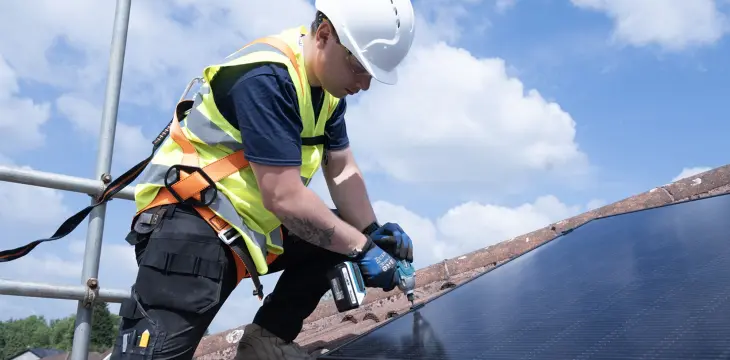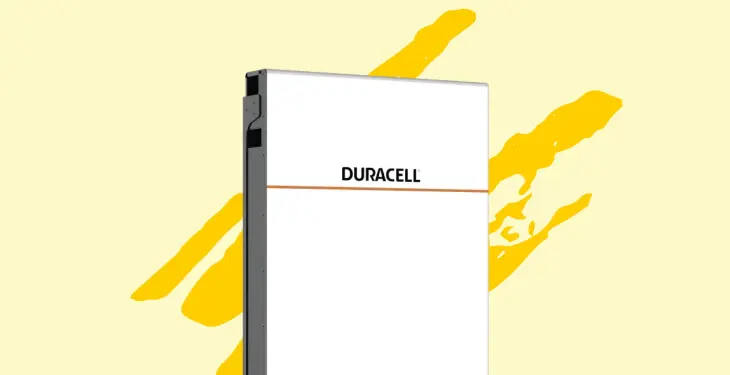

Written by Bethany Armstrong
Renewables Manager
Updated: 5th January, 2026
The UK solar market in 2026 offers a mix of international leaders and local specialists. Each brand has its own strengths, whether that is efficiency, warranty cover, or affordability.
See how much you could save with a solar & battery quote.
Choosing the right solar panels in 2026 can feel overwhelming with so many brands competing for attention. Efficiency, warranty, and long-term reliability all matter, especially in the UK where cloudy days are common. The best solar panel brands in the UK this year include trusted names like LONGI, AIKO, JA Solar, SunPower, REC, and Qcells, offering a balance of performance, durability, and value.
Each brand brings something different to the table. Some focus on maximum efficiency, others on affordability, while a few stand out for strong warranties that protect your investment for decades. By comparing the top options side by side, it becomes easier to see which brand fits specific needs, whether that’s higher output, sleek design, or budget-friendly pricing.
This guide highlights the ten best solar panel brands available in the UK right now, showing how they perform in real conditions and what sets them apart. With clear comparisons and straightforward insights, it points directly to the choices that make the most sense for UK homes in 2026.
The UK solar market in 2026 offers a mix of international leaders and local specialists. Each brand has its own strengths, whether that is efficiency, warranty cover, or affordability.
SunPower stands out with high efficiency and long 40-year warranties, though prices are higher.
Aiko delivers premium N-type all-black modules with strong output per square metre and long warranties, ideal for modern UK roofs.
Jinko Solar offers some of the highest power outputs, reaching up to 635 W, but warranty cover is shorter.
Sharp Solar remains widely available and reliable, with decades of experience in solar technology.
LONGi provides strong value for money, combining good efficiency with competitive pricing.
JA Solar offers compact yet powerful panels that suit smaller roofs.
UKSOL is a British manufacturer for buyers who prefer to buy local, with competitive warranties.
REC Group panels are known for low degradation and steady performance.
Viridian Solar specialises in in-roof systems designed for seamless integration with UK housing.
Perlight Solar focuses on clean aesthetics and all-black designs with efficiency above 22 percent.
Brand | Max Output (W) | Max Efficiency | Warranty (Years) |
SunPower | 475 | 22.3% | 40 |
Aiko | 460 | up to ~23.5% | 25–30 |
Jinko Solar | 635 | 22.7% | 12 |
Sharp Solar | 580 | 21.8% | 15 |
LONGi | 610 | 23.0% | 25–30 |
JA Solar | 625 | 22.4% | 12 |
UKSOL | 450 | 21.6% | 30 |
REC Group | 405 | 22.6% | 20 |
Viridian Solar | 320 | 20.7% | 25 |
Perlight Solar | 430 | 22.3% | 30 |
The selection focuses on what matters most to UK homeowners: efficiency, durability, warranty length, value for money, and real user feedback. We looked for conversion rates above 23 percent where possible, low degradation and long product and performance guarantees, strong satisfaction ratings, solid watts per pound value, and evidence of responsible manufacturing.
Factor | What We Looked For |
Efficiency | Conversion rate above 23% where possible |
Durability | Low degradation and long warranties |
Customer feedback | High satisfaction in UK installs |
Price | Strong watts-per-pound value |
Sustainability | Cleaner production and recycling efforts |
Different brands in 2026 balance efficiency, durability, and cost in distinct ways. Homeowners should look at efficiency ratings, warranty terms, and wattage ranges to see which panels fit their roof and budget best.
Efficiency remains a key metric. Premium options like Aiko N-type and SunPower Maxeon reach 22–24% in real-world conditions. Panels using N-type TOPCon technology also show strong gains, often above 21%, making them reliable for UK weather.
Warranty coverage varies. Top brands such as SunPower and Aiko offer 25-year product warranties with performance guarantees up to 30 years. Mid-range brands like Trina or Qcells usually provide 20–25 years, which is still solid for most households.
Typical wattage per panel now sits between 400–460 W for mainstream residential models. Higher-density modules, often aimed at smaller roofs, push closer to 460 W, while value-focused options remain in the 400–430 W range.
Brand / Series | Efficiency (%) | Typical Wattage | Warranty (Product / Performance) |
Aiko N-type | 21–23% | 420–460 W | 25 yrs / up to 30 yrs |
SunPower Maxeon | 22–23%+ | 420–450 W | 25 yrs / 30 yrs |
REC Alpha Pure-R | 21–22% | 410–430 W | 25 yrs / 25 yrs |
Qcells Q.TRON | ~21% | 400–430 W | 20–25 yrs / 25 yrs |
Trina Solar Vertex S+ | 21–22% | 420–450 W | 25 yrs / 25 yrs |
Yingli / TOPCon | 20–22% | 400–435 W | 20–25 yrs / 25–30 yrs |
This comparison highlights how efficiency, warranty, and wattage differ across leading UK panel brands in 2026. Each factor influences system design, long-term output, and cost-effectiveness.
Different brands stand out for different reasons. Some lead in efficiency, while others focus on cost, durability, or design. The right choice depends on the homeowner’s priorities, such as roof size, budget, or long-term reliability.
SunPower’s Maxeon 6 AC panels remain among the most efficient options available in the UK in 2026. With efficiency levels around 22.8%, they convert more sunlight into electricity than most rivals. This makes them ideal for homes that want maximum energy output from limited roof space.
High efficiency is especially useful in the UK’s variable weather. Even on cloudy days, these panels capture more usable energy compared to standard models. The built-in microinverter also helps each panel operate independently, so partial shading does not reduce the performance of the whole system.
For homeowners who place energy yield above all else, SunPower continues to set the benchmark. The higher upfront cost is offset by greater long-term production and reduced reliance on the grid.
JA Solar’s DeepBlue 4.0 X offers one of the strongest balances between price and performance. With efficiency close to 21.7% and a competitive cost of around £270 per panel, it delivers reliable output without the premium price tag of top-tier brands.
The panels use n-type cell technology, which helps slow down power loss over time. This means they can provide consistent returns for decades, even in the UK’s cloudy climate. For households with larger roofs, the slightly lower efficiency is less of an issue, as more panels can be added to meet demand.
JA Solar is widely available through UK installers, making it a practical choice for cost-conscious buyers who still want a dependable product.
Homes with limited roof space need panels that generate high output in a compact size. The Jinko Tiger Neo N-type series is designed with this in mind. Despite its smaller footprint, it produces up to 440 W per panel with efficiency around 22.5%.
This makes it well-suited to terraced houses or properties with awkward roof layouts. Its n-type cells also improve low-light performance, which is valuable in northern regions of the UK where sunshine hours are shorter.
By combining compact design with strong efficiency, Jinko offers a solution for households that cannot install many panels but still want meaningful energy savings.
Durability and warranty protection matter when investing in solar panels. SunPower leads again in this category, offering a 40-year warranty on its Maxeon range. This is one of the longest guarantees available and reflects the company’s confidence in its product build quality.
Most brands stop at 25 years, but SunPower’s extended cover gives homeowners reassurance that their system will remain productive for decades. The warranty typically covers both product defects and performance guarantees, ensuring panels continue to operate above a set efficiency level.
For those who want maximum peace of mind, especially given the upfront cost of solar, SunPower’s warranty terms are unmatched in the UK market.
For homeowners who value aesthetics, the Qcells Q.TRON BLK-G2+ is a strong choice. Its all-black design blends neatly with modern and traditional rooftops, avoiding the patchwork look of older solar panels.
While style is the main draw, performance is also competitive. The panel achieves around 22% efficiency and includes a 25-year warranty. Qcells has a reputation for thorough quality testing, which adds confidence to its sleek design.
This makes it attractive for those who want their home to look uncluttered while still benefiting from renewable energy. It’s a good compromise between style, performance, and cost.
Shaded roofs can reduce system efficiency if panels are wired together without advanced technology. The SunPower Maxeon 6 AC addresses this issue through its integrated microinverter. Each panel operates independently, so shading on one does not drag down the output of others.
This feature is particularly useful in urban areas where chimneys, trees, or neighbouring buildings cause partial shading. It also allows homeowners to track performance panel by panel through a monitoring app.
For properties with complex roof shapes or inconsistent sunlight, this technology ensures steady production throughout the day. It removes one of the biggest barriers to solar adoption in built-up areas.
Each brand offers different strengths in efficiency, cost, design, and warranty. Some focus on premium technology with long-term durability, while others aim to balance affordability with reliable performance. The details below highlight what sets each manufacturer apart in the UK market for 2026.
Aiko has gained attention for its all-back contact (ABC) solar cell technology. This design removes front-side busbars, increasing light absorption and improving efficiency. In 2026, Aiko panels reach efficiency levels above 23%, making them one of the highest-performing residential options.
The company focuses heavily on aesthetics. Panels have a uniform black surface that blends well with modern rooftops. This appeals to homeowners who want both performance and style.
Aiko also offers competitive warranties, often 25 years for product and performance. While pricing is higher than mid-range brands, the combination of high conversion efficiency and sleek design makes Aiko attractive for households with limited roof space.
SunPower’s Maxeon line is widely recognised for durability and efficiency. The Maxeon 6 remains a leading choice in 2026, offering up to 22% efficiency and a strong 25–40 year warranty. Its low degradation rate—0.2% annually after the first year—ensures long-term output stability.
The newly introduced Maxeon 7 builds on this with even higher wattage options, making it suitable for UK households with higher energy demands. Maxeon panels use copper-backed cells, which resist cracking and corrosion better than conventional designs.
Although SunPower panels sit at the premium end of the market, their long lifespan and consistent performance make them a strong investment. Many UK homeowners choose them when reliability and warranty coverage are top priorities.
REC, a Norwegian-founded manufacturer, is known for its Alpha Pure-R series. These panels achieve efficiency rates above 22% and are designed for durability with low degradation. For a typical 3-bedroom UK home, they provide a balance of output and panel size.
REC panels are also designed with sustainability in mind. The company uses lead-free manufacturing processes, which appeals to environmentally conscious buyers.
Warranty coverage ranges from 20 to 25 years depending on the installer. While pricing is mid-to-high compared to other brands, REC’s combination of efficiency, eco-friendly production, and strong performance makes them a trusted option.
Qcells is a German brand with a strong reputation in the UK. Their panels are valued for combining reasonable cost with solid efficiency, usually in the 20–21% range. In 2026, Qcells continues to offer both residential and commercial solutions.
One of Qcells’ key advantages is its long warranty coverage, with some models offering up to 30 years. This is a major selling point for homeowners who want peace of mind.
Qcells also invests in anti-leakage and anti-potential induced degradation (PID) technologies, which help maintain performance in varying UK weather conditions. This makes them reliable for long-term use in damp or coastal environments.
JA Solar is one of the largest global manufacturers and supplies panels widely across the UK. Their products are often chosen for their cost-effectiveness while still maintaining good efficiency, typically around 20–21%.
The company offers a broad range of monocrystalline panels, including bifacial options that capture light from both sides. This is useful for ground-mounted systems or areas with reflective surfaces.
JA Solar panels usually come with 12–15 year product warranties and 25-year performance warranties. While not as premium as SunPower or REC, they provide dependable performance at a lower price point, making them suitable for budget-conscious households.
JinkoSolar is another global leader with a strong presence in the UK. Their Tiger Neo series uses n-type TOPCon cells, achieving efficiency levels above 22%. This puts them close to the performance of higher-end brands but at a more competitive cost.
Jinko panels are tested for durability under extreme conditions, including high winds and heavy snow loads. This makes them a practical choice for varied UK climates.
Warranty terms are generally 12 years for product and 25–30 years for performance. JinkoSolar panels are widely available, which helps keep installation costs competitive and ensures good supply for UK homeowners.
Trina Solar is known for innovation in high-power panels. Their Vertex S+ series offers outputs above 430W, making them suitable for homes with higher energy consumption. Efficiency levels range from 21–22%, which is strong for the price bracket.
Trina focuses on reliability and affordability. Panels are competitively priced and supported by a 25-year performance warranty. This balance makes them a popular choice for homeowners who want solid performance without paying premium prices.
The company also invests in bifacial and large-format panels for commercial projects, but its residential range remains one of the most widely adopted in the UK.
Canadian Solar offers a wide range of panels, from cost-effective models to higher-efficiency options. Their HiHero series uses heterojunction (HJT) technology, achieving efficiencies above 22%. This places them among the more advanced panels available in 2026.
For UK homeowners seeking affordability, Canadian Solar’s standard monocrystalline panels provide good performance at lower upfront cost. These models typically come with 12–15 year product warranties and 25-year performance warranties.
The brand is well established, with a strong global supply chain. This ensures good availability and competitive pricing, making Canadian Solar a reliable mid-range option.
Longi is one of the world’s largest solar manufacturers and a leader in monocrystalline technology. Their Hi-MO 6 series panels offer efficiency levels above 22% and strong performance in low-light conditions, which is important in the UK’s variable climate.
Pricing is competitive, making Longi a popular choice for both residential and commercial installations. Warranties typically include 12 years for product and 25 years for performance.
Longi also invests heavily in research, pushing forward n-type cell technology. This ensures that their panels continue to improve in efficiency and durability year after year.
Panasonic has long been associated with high-quality solar technology. Their EverVolt series continues in 2026 with efficiency rates of around 21–22%. These panels are designed to perform well in high temperatures, which helps maintain output during summer months.
Panasonic panels are backed by 25-year product and performance warranties. While they are priced at the higher end, their reputation for reliability makes them attractive to homeowners who want long-term assurance.
Although Panasonic has scaled back manufacturing compared to some rivals, they remain a respected brand in the UK market. Their panels are often chosen by customers who value established reliability and brand trust.
Last updated: 5th January, 2026

Written by Bethany Armstrong
Renewables Manager at iHeat
Bethany Armstrong is a renewables expert and operations manager at iHeat, specialising in heat pump solutions and solar project delivery across the UK.
LinkedInArticles by Bethany Armstrong are reviewed by iHeat’s technical team to ensure accuracy and reliability.

20th February, 2026
Yes, you can install home battery storage without solar panels in the UK. A battery-only s...
 Read Article
Read Article

19th February, 2026
Your Distribution Network Operator is the regional company that owns and manages the elect...
 Read Article
Read Article

06th January, 2026
These grants not only help residents save money on installation but also help lower energy...
 Read Article
Read Article
No obligation. Takes less than 60 seconds.